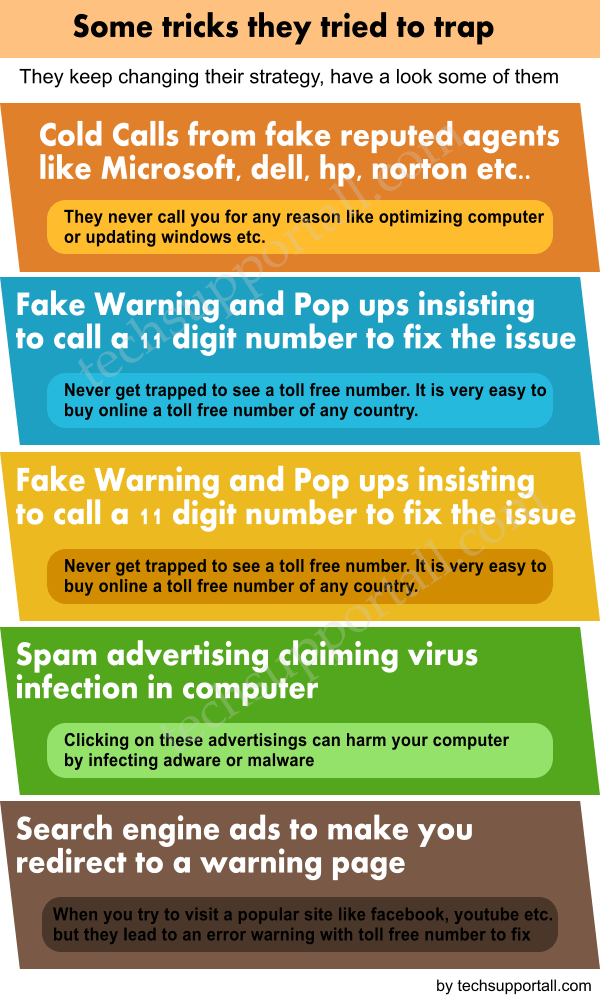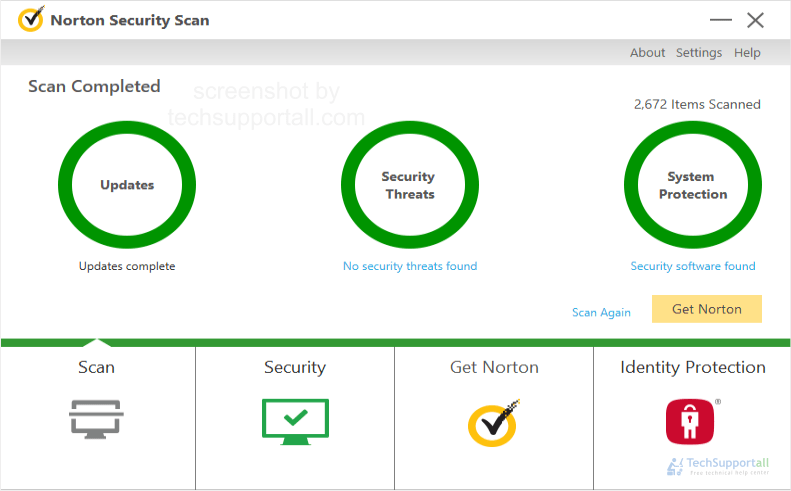What is Tech Support
Almost every person who is working on computer either for home use or office use requires technical support. Normally people call tech support guys and they visit onsite to resolve the issue. But these days another type of technical support which is highly in trend is Remote Technical Support.
What is Remote Technical Support? In fact, with this kind of support the tech support guys ask you to take control of your computer remotely and fix the issue remotely without visiting your site. So it is a cheap and quick method to get tech support. There are many good and trusted tech support companies there but the majority are from Fraud and Fake tech support companies. See the facts below which give you an idea about it.

What is the Tech Support Scam
Fake tech support companies use many methods to grab your money for their services or software which you have no requirement for. First they will show you the fake warning or errors on your computer and then ask you to connect to your computer remotely to fix the issue and will sell you the tech support plans.

People who spends most of their time in front of the computer working or doing other things know how bad it feels to have the crash or worst of all have security breaches. If you get a message flashing on your computer that starts flashing that your computer has an Adware security breach you will freak out, especially if your computer is a lifeline that you simply cannot function without. Ignore the message and try not to get you to panic to get you to call the weird 11 digit number for tech support.
Most of the messages claimed to have been from Microsoft Tech support, but scammers have since moved to Apple. Yes, computers do get attacked by Malware, which is why everyone needs to get good anti-virus software installed but there are a lot of viruses that get engineered everyday so sometimes some do get out. Scammers claiming to be associated with computer companies use this fact by sending out fake virus alerts that are aimed at selling you software or a service you don’t really need but worst of all gaining remote access to your computer.
Tech support schemes are really elaborately set up by some clever people taking advantage of people who aren’t technically savvy. They set up websites that are fake. They even offer free security scans and while you are using that free scan, they are inserting whatever they want to insert into your system. The latest scammers use phone calls to solicit customers
How does the Scam Work?
Scammers obtain your name, phone number and other public information on online directories. If they can get your e-mail address, it’s even easier because they can send you malware in an e-mail. The latest ruse however is to call you and tell you they are working for some computer company, mostly Microsoft because a lot of computers use the Microsoft platform. They tell customers that their system is showing that they have malicious content on their phone and if they don’t get it fixed the computer might crash. The story they lay out is that you don’t have to worry about taking your computer to some repair shop but that they can fix the problem remotely for a fee. For most people this is ideal because people like the idea of having work done on their computer without the hassle of schlepping the thing to some repair technician and most of all the idea of saving money and having work that would normally take 5 to 7 days to fix can be fixed in a matter of hours. First they scare you and then they offer a quick, painless and cheap solution to problems that in reality, you do not have. If you fall for this you will be surrendering your credit card information and granting criminals access to your computer.
Some of these scammers have taken special precautions to look legitimate for instance there is one that uses a website address that resembles Apple’s tech support address “ara-apple.com” instead of the legitimate site https://ara.apple.com/ where Apple customers interact with real Apple technicians to troubleshoot whatever problems they might have with their computers.
Quick tips to avoid tech support scams
- Never download the email attachment if it is not from the trusted source.
- Never click on advertisements saying your computer is infected or your computer is slow etc.
- Always download software from the trusted source only.
- Install a good Antivirus Software along with a good Anti-malware in your computer.
- Always hang up the call if you receive a caller claiming that they are an agent of Microsoft or such a reputed company.
- For customer support, always go to the original site of the vendor like microsoft and find out the number from their official website rather than searching for tech Support on the internet in search engines like Google and Bing.
- Never search a popular sites like facebook, Youtube in search engine always open these website by typing full address on the address bar like www.facebook.com etc..
- Read this article by Microsoft to prevent Microsoft tech support scam.
- Spread awareness to other people to avoid it and fight back.
Methods used by these Scammers
Though these scammers always keep changing their strategy to trap people, some of the common methods used by them are given below which give you an idea about their strategies. They simply try to any how called by the customer and take the remote control of your PC.
Cold Calls from fake Microsoft agent or other reputed company agent.
These people arrange to get your name and phone number from the sources and call you as a reputed company agent like “I am calling from Microsoft” then they said you for some error or infection in your computer and ask you to connect the computer remotely to fix the issue for Free. Or they will say that they have to do a free system optimization etc.
Fake Tech Support Popups
Sometimes they arrange to infect your computer with their adware or malware. They can send you malware in emails that appear to be from a legitimate reputed company. They can even manage to install this adware when you download something from the internet. Even some websites infect your computer just by visiting the website. Good internet security is always recommended to avoid all these traps. This adwares you of the pop up on your computer claiming that your computer is infected and to fix the issue call this Toll Free Number, A 11 digit number will flash on the pop up.
Learn more about fake tech support popups
Spam Advertising
Suppose you have a genuine little problem in your system and you need to call tech support, what will you do? Obviously you will search on Internet in Search engine or in web directories. These Scam people advertise their company as a legitimate company by listing themselves on web directories and even advertise on Google search, Bing Search etc. to grab the attention and show you the Toll Free number claiming Microsoft Tech Support etc.. Then they instead fixing your actual issue, make it a big issue and ask you to pay extra money.
Even some times you can see the banner advertisements which appears on some websites which is showing google ads saying that your computer is infected or your computer is running slow etc. Never click these type of advertising.
Fake Popular Site advertising in search engines
These days peoples are commonly practicing just typing the name of the website on the address bar which leads to searching with the default search engine. Like you searched for Youtube and in search results spammers website will be shown on the top which looks like the youtube, As you will click on that ad, A warning will appear in front of you showing some error in visiting that website with a toll free number to resolve the issue.
Learn more about malwaretising in google adwords
What to do if you get a call from a “tech Support”?
If you ever get a phone call or some strange pop-up on your computer, warning you about a possible security threat. Do not panic, do not call the number they send you do not waste time trying to understand what George or Steve or Bob on the line says he does and can help you with for less than $200. Hang up and call a company you know to be genuine. Do not fall for the sense of urgency someone has over what could happen to your computer, scammers like to you pressure because they understand that when people are panicked they operate from that position of fear.
Never give remote access to anyone, even if they genuinely work for Microsoft. The truth is Apple and Microsoft will not try to take control of your computer but will walk you through possible solutions when you have a problem.
Numbers can be spoofed and just because the number on your caller ID looks like that Microsoft number you have does not mean it really does. Criminals have ways of making themselves appear like something else operating from somewhere when they really could be at some level half way across the globe.
More Resources
This is a huge topic and needs a lot more research meanwhile you can checkout other resources regarding tech support scams to learn more.
Hearing of senators on tech support scam
Tech Support Scam complete guide by Malwarebytes
Learn how to have fun by reading this article conversation with tech support scammer
We will add more resources and information meanwhile you can share your experience and give suggestions, in the comment box below.

